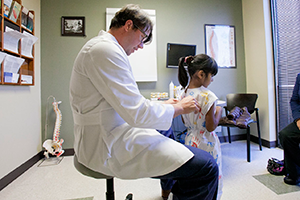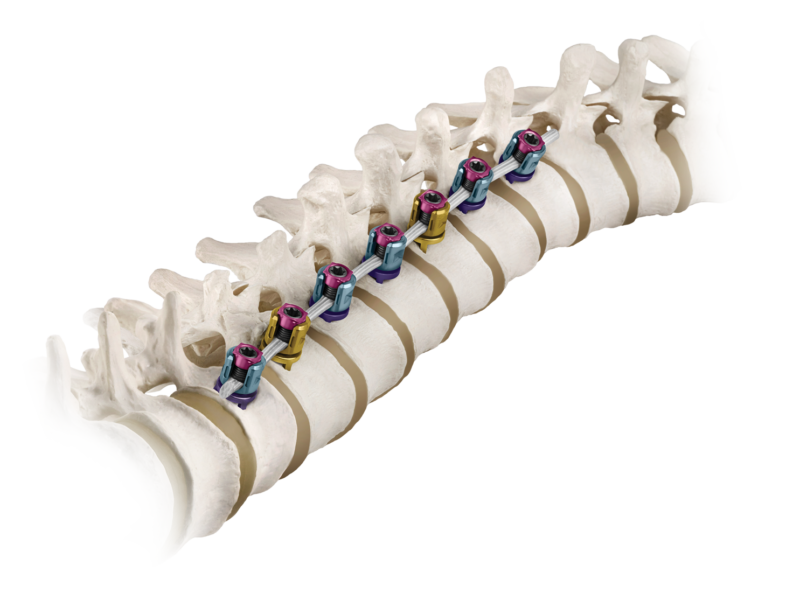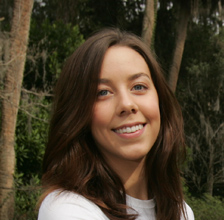
Learn more about the providers at Texas Spine and Scoliosis, the only spine specialized neurosurgery, orthopedic surgery, and non-surgical rehabilitation group in the central Texas area.
NOTICE: Our main Austin clinic location has moved to 1004 West 32nd Street. Click here for a map.
 When should a person consider scoliosis surgery to straighten a curve? It is a difficult decision. Issues to consider include deformity, pain, function, and the effect of the scoliosis on internal organs. Waiting too long carries risks: progression of the curve, loss of lung function and progressive lumbar disc degeneration.
When should a person consider scoliosis surgery to straighten a curve? It is a difficult decision. Issues to consider include deformity, pain, function, and the effect of the scoliosis on internal organs. Waiting too long carries risks: progression of the curve, loss of lung function and progressive lumbar disc degeneration.
Younger patients, even with large deformities, have flexible spines, recover quickly and can have dramatic correction of the scoliosis. As a person gets older the spine is less exible and the recovery can be more significant. Advances in spinal deformity surgery have produced new instrumentation, new techniques, better results, quicker recovery and a faster return to activity.
Most juvenile and adolescent idiopathic (genetic) scoliosis can be treated with observation and bracing. Patients who are candidates for brace treatment have been the beneficiary of recent Level One data on the effectiveness of bracing in controlling scoliosis up to 50% of the time. However, in patients in which bracing is not effective, or when the curve was discovered later, other options are now available.
There are two new minimally invasive procedures that do not involve fusion, and can be used to treat pa ents with progressive brace-resistant scoliosis. Both access the spine through ny incisions near the ribs:
 Both techniques work on one side of the curve to prevent it from worsening during the adolescent growth spurt. Sometimes it may be the only surgery needed. A second benefit of both minimally invasive techniques is that they don’t burn any bridges and more traditional corrective instrumentation can be used later on if necessary.
Both techniques work on one side of the curve to prevent it from worsening during the adolescent growth spurt. Sometimes it may be the only surgery needed. A second benefit of both minimally invasive techniques is that they don’t burn any bridges and more traditional corrective instrumentation can be used later on if necessary.
Dr. Matthew Geck at Texas Spine & Scoliosis Center is one of the developers of “mini scoliosis surgery.” The current 4th generation pedicle screw surgery, used to correct a large spinal curve, can involve a 12 to 24-inch long incision. While this surgery is effective, the recovery period is significant. Conversely, with mini scoliosis surgery, Dr. Geck is able to use special instruments and work through three smaller incisions to straighten the spine with very little muscle and tissue disruption. The benefit to the patient is significant:
Adults with scoliosis frequently need consultation with a scoliosis specialist as well. Some have progressive scoliosis that is becoming painful, affecting their lungs, or damaging their lumbar discs.
Others can have severe degeneration of their scoliosis leading to “collapsing spine syndrome,” in which they lose height, stoop forward and develop bone spurs that pinch their spinal nerves.
Finally, previously operated patients may have been map-aligned, perhaps by Harrington or CD rods, and with age can develop “Flatback Syndrome” with terrible back pain and disability. Dr. Geck has extensive experience with all of these scoliosis issues.
Texas Spine and Scoliosis is a regional referral center for the treatment of back and neck pain and scoliosis

Learn more about the providers at Texas Spine and Scoliosis, the only spine specialized neurosurgery, orthopedic surgery, and non-surgical rehabilitation group in the central Texas area.
 Texas Spine & Scoliosis approved for the new BRAIVE scoliosis tethering study
Texas Spine & Scoliosis approved for the new BRAIVE scoliosis tethering study

Read about various patient success stories that have been performed by the physicians at Ascension Texas Spine & Scoliosis